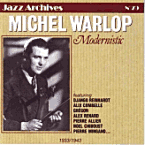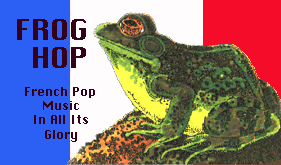 Wal-Berg "Les Plus Belles Valses De Strauss" (Ricordi Records, 1959) (10" LP)
Wal-Berg "Les Plus Belles Valses De Strauss" (Ricordi Records, 1959) (10" LP)
A classical outing from he-who-shall-not-be-named, composer, conductor and bandleader Voldemar Wal-Berg (ne Voldemar Rosenberg, 1910-1994) who was a ubiquitous presence in French popular music from the 1930s onward, primarily known for his work backing singers such as Josephine Baker, Damia, Jean Sablon, and Charles Trenet, as well as for composing film songs for Marlene Dietrich, as well as a mountain of symphonic pieces and film scores. His career spanned both sides of World War Two, with the eminent, highly-regarded Wal-Berg touring widely with numerous popular singers while also maintaining a place in the French classical establishment. These recordings of Strauss waltzes are perhaps a bit staid, considering his role in the growth of the jazz-tinged chanson, but there were few "solo" records of his that I could find, as opposed to his countless collaborations with other marquee artists.
 Michel Warlop "Special Michel Warlop: 1933-1943" (EMI/Pathe Marconi, 1989)
Michel Warlop "Special Michel Warlop: 1933-1943" (EMI/Pathe Marconi, 1989)
 Michel Warlop "Modernistic: 1933-1943" (EPM, 1993)
Michel Warlop "Modernistic: 1933-1943" (EPM, 1993)
French violinist Michel Warlop (1911-1947) came onto the booming Parisian music scene of the 1930s as an accompanist for such stars as Germain Sablon and Maurice Chevalier; in his own work he pursued a more swinging style, drawn to the "hot" jazz of gypsy guitarist Django Reinhardt and his longtime partner, violinist Stephane Grappelli. Warlop also indulged in somewhat riper, more romantic material, popular dance music with an orchestral hue -- this generously programmed album gathers fine examples of both styles. Among the any musicians are Django and Joseph Reinhardt, Alix Combelle, Andre Ekyan, and a host of French jazz and pop luminaries. Nice collection of a lesser-known French jazz pioneer. Includes some fun vocal numbers, too!
 Michel Warlop "The Quintessence: Paris 1933-1943" (Fremeaux & Associes, 2013)
Michel Warlop "The Quintessence: Paris 1933-1943" (Fremeaux & Associes, 2013)
A more definitive, 2-CD set covering the same time period, and including Warlop's magnum opus, the symphonic "Swing Concerto," from 1942. Though he performed and recorded extensively, both in his own bands and with countless other pioneers of French pop and jazz, Warlop's star fell quickly during the Second World War, due in part to his alcoholism and self-destructive tendencies, as well as rumors of his having collaborated with the German occupation by having played on the radio and his stint with the Raymond Legrand's orchestra, with Legrand having been considered an active collaborator with the German-controlled Vichy government. At any rate, he died young in 1947 and many of his recordings were apparently lost during the war; this 46-song collection is the largest archive of his work to date.
 Eddie Warner "...Et Sa Musique Tropical" (Odeon Records, 1953) (LP) (10")
Eddie Warner "...Et Sa Musique Tropical" (Odeon Records, 1953) (LP) (10")
Bandleader Eddie Warner specialized in Perez Prado-style latin-jazz dance music, and was pretty darn good at it. He produced a string of 10" LPs throughout the 1950s, many of them bearing the same generic title, Eddie Warner Et Sa Musique Tropical all of them marked by a high level of familiarity with authentic Cuban-style rumba, and up-to-date Latin jazz dance music. His albums generally included eight songs, and were accompanied by a series of picture-sleeve EPs (four songs each) and regular two-song singles, which sometimes also included album art. These singles and EPs often broke down along thematic lines: music by an individual composer, from a specific country, on a particular topic, etc. This early album (his first?) notably includes four songs credited to Eddie Warner-- "Baluma," "Pimienta," "Tapioca" and "Terre Tropicale" -- along with two by Cuba's Ernesto Lecuona, and one each from Brazilian composer Ayres da Costa Pessoa (aka Pernambuco), and rising star Perez Prado. On later releases, as Prado became a dominant force in latin dance music, Warner showcased more of his work and embraced Prado's denser, more cosmopolitan compositional style. Warner's own arrangements and tonality got richer as time went by, but even his earliest records are pretty high-calibre, and genuinely enjoyable, with little of the rigidity or intentional kitschiness that mark so much of the French tropical exotica of the 1930s and '40s. At least two generously programmed reissue CDs came out on the ILD label (see below)
 Eddie Warner "...Et Sa Musique Tropical" (Odeon Records, 1954) (LP) (10")
Eddie Warner "...Et Sa Musique Tropical" (Odeon Records, 1954) (LP) (10")
This album includes three Perez Prado hits, kicking off with "Mambo No. 5," along with "Mambo No. 8" and "Mambo En Sax." Of equal or perhaps greater interest are the Gallic originals that frame Prado's pieces, two by Warner himself ("Aux Philippenes" and "Guindilla") as well as Swiss-French-Belgian compatriots such as Ivon De Bie, Piere Dudan, Jake Holmes, as well as Dominican composer Eduardo Brito. Imitative, to be sure, but also quite good.
 Eddie Warner "...Et Sa Musique Tropical" (Odeon Records, 1955) (LP) (10")
Eddie Warner "...Et Sa Musique Tropical" (Odeon Records, 1955) (LP) (10")
Great album art, first off. Classic exoticization! The set list is far-flung and impressive, notably including two tunes from Perez Prado, and one each by Cuban jazz/dance stars Bebo Valdes and Enrique Jorrin, Brazil's Mario Filho, Italian composer Virgilio Panzuti and a Tin Pan Alley offering from Nat Simon. Warner's lone entry is a ditty titled "Avec Toi," all of it sleek, swinging and genuinely fun.
 Eddie Warner "100% Mambo" (Odeon Records, 1956) (LP) (10")
Eddie Warner "100% Mambo" (Odeon Records, 1956) (LP) (10")
A much stronger presence of (North) American composers and a more overt embrace of 'Fifties-style latin-dance kitsch, with the album kicking off with Bob Merrill's "Mambo Italiano," then moving into tunes by Duke Ellington, Dizzy Gillespie, Barclay Allen and Lalo Schifrin, as well as Basque composer Sebastian de Yradier's classic "La Paloma" and the album's lone French offering, Paul Piot's "El Gato Negro." Mambo!
 Eddie Warner "100% Cha-Cha-Cha" (Odeon Records, 1956) (LP) (10")
Eddie Warner "100% Cha-Cha-Cha" (Odeon Records, 1956) (LP) (10")
What perzackly was the difference between "mambo" and "cha-cha-cha"? It's debatable, but for Eddie Warner in 1956 the difference seems to have been between a mambo craze that bore the stamp of American pop culture and "cha-cha" music that was still anchored in an arguably more "authentic" Latin American roots. This set includes deep-cut dance tracks from mostly-Cuban and Puerto Rican sources: Raul Aguilar, Chiquitin Garcia, Rene Hernandez, Joe Loco, Obdulio Morales, Otilio Portal, Marco Rizo, as well as French-born Francis Lopez. Swinging!
 Eddie Warner "Surprise-Party Chez Eddie Warner" (Odeon Records, 1959) (LP) (10")
Eddie Warner "Surprise-Party Chez Eddie Warner" (Odeon Records, 1959) (LP) (10")
 Eddie Warner "...Et Sa Musique Tropical" (Marianne Melodie)
Eddie Warner "...Et Sa Musique Tropical" (Marianne Melodie)
 Eddie Warner "...Et Sa Musique Tropicale" (ILD, 2002)
Eddie Warner "...Et Sa Musique Tropicale" (ILD, 2002)
 Eddie Warner "...Et Sa Musique Tropicale" (ILD, 2008)
Eddie Warner "...Et Sa Musique Tropicale" (ILD, 2008)
 John William "Le Voix D'Or" (Marianne Melodie, 2004)
John William "Le Voix D'Or" (Marianne Melodie, 2004)
A mainstream pop singer who dabbled in ballads, showtunes, Latin/tropical exotica, American-style gospel and other styles, John William (ne Ernest Armand Huss, 1922-2011) was born in colonial-era Cote d'Ivoire, but was sent to France to live with relatives while he was still a toddler. During World War Two, he took part in industrial sabotage against the occupying Germans and was imprisoned, tortured and sent to work in a prison camp, although he was eventually liberated at the end of the war. Huss pivoted to a career in the performing arts in the late 1940s and began singing in cabarets around 1949; adopting the stage name John William, he made his first recordings in the early 'Fifties and became a top star of the era. This collection includes some of his earliest work, a couple of dozen tracks originally released between 1951-54, with backing from Raymond Legrand's band as well as the Orchestra Wal-Berg. This is the first of three retrospectives of his early work, compiled by the Marianne Melodie label, though William continued to record well after the time covered in these collections.
 John William "Le Voix D'Or: Volume Two" (Marianne Melodie, 2008)
John William "Le Voix D'Or: Volume Two" (Marianne Melodie, 2008)
This volume picks up where the first one left off, collecting tracks from 1954-58-ish, with material ranging from film themes, sambas, chanson ballads and even some country stuff (such as "Seize Tonnes," his cover of the Tennessee Ernie Ford hit, "Sixteen Tons.") John William is again backed the Wal-Berg Orchestra, as well as Claude Vizzori, and others.
 John William "Le Voix D'Or: Volume Three" (Marianne Melodie, 2010)
John William "Le Voix D'Or: Volume Three" (Marianne Melodie, 2010)
This set doesn't include original release dates on the songs, though we still see William working with Claude Vizzori, as well as Mario Bua and Mario Marjac... Probably ending in the early 1960s, I'd imagine.
More Chanson > Compilation Albums


French Music Index
French Rock & Pop


 Michel Warlop "Modernistic: 1933-1943" (EPM, 1993)
Michel Warlop "Modernistic: 1933-1943" (EPM, 1993)
 Michel Warlop "The Quintessence: Paris 1933-1943" (Fremeaux & Associes, 2013)
Michel Warlop "The Quintessence: Paris 1933-1943" (Fremeaux & Associes, 2013)
 Eddie Warner "...Et Sa Musique Tropical" (Odeon Records, 1953) (LP) (10")
Eddie Warner "...Et Sa Musique Tropical" (Odeon Records, 1953) (LP) (10")
 Eddie Warner "...Et Sa Musique Tropical" (Odeon Records, 1954) (LP) (10")
Eddie Warner "...Et Sa Musique Tropical" (Odeon Records, 1954) (LP) (10")
 Eddie Warner "...Et Sa Musique Tropical" (Odeon Records, 1955) (LP) (10")
Eddie Warner "...Et Sa Musique Tropical" (Odeon Records, 1955) (LP) (10")
 John William "Le Voix D'Or" (Marianne Melodie, 2004)
John William "Le Voix D'Or" (Marianne Melodie, 2004)
 John William "Le Voix D'Or: Volume Two" (Marianne Melodie, 2008)
John William "Le Voix D'Or: Volume Two" (Marianne Melodie, 2008)


